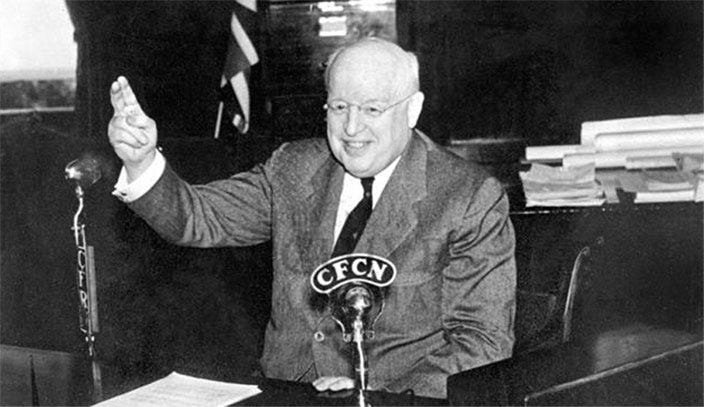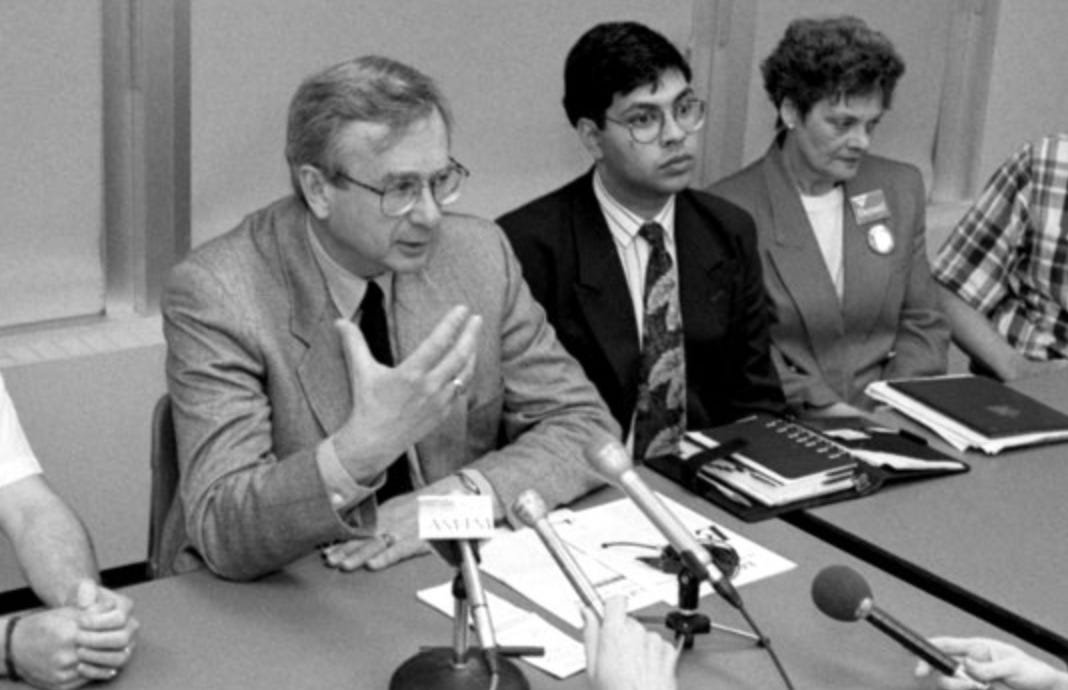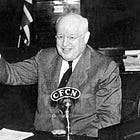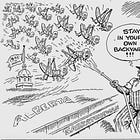Alberta's first MLA recall experiment spiked when Premier Aberhart targeted
Social Credit's recall law lasted 18 months on the books before it was repealed

A recent proliferation of MLA recall campaigns has fuelled speculation that Premier Danielle Smith’s United Conservative Party government could repeal the law, just like Premier William Aberhart did when his party’s MLAs faced recall campaigns 88 years ago. As I reminded readers last month, Aberhart’s Social Credit government passed a recall law in April 1936 and then repealed it in October 1937 after the Premier was targeted by voters in his own riding.
The MLA recall law was a key plank of the Social Credit Party platform in the August 1935 election that saw the scandal-plagued and Great Depression battered United Farmers of Alberta swept out after 14 years as government. Desperate for economic and political change, Albertans overwhelmingly embraced Aberhart’s party and the promises of its radical (and impractical and unconstitutional) Social Credit theory.
Reaction to Aberhart’s election win was met by sensational newspaper headlines like “Alberta Goes Crazy!,” confused responses from central Canada, and victory marches by sympathetic groups around the globe. When learning of the election results in Alberta, the Social Credit Greenshirts in London are reported to have marched around the Bank of England headquarters holding torches and blowing their trumpets, no doubt believing the modern day Fall of Jericho was upon them.
So, along with a radical agenda of monetary reform and a governing-style that drew inspiration from the authoritarians of 1930s Europe (along with a deep rooted belief in antisemitic conspiracy theories), Aberhart’s party set about trying to figure out how to govern. The first five years of what would become a 36-year long Social Credit dynasty were without a doubt some of the most chaotic and tumultuous ever in Alberta politics.
“When I have been in office for six months you can banish me to the tall timbers if you like,” Aberhart confidently boasted during a December 1935 broadcast of his popular Back to the Bible Hour radio program.
The Social Credit election platform had declared that “every social credit candidate must agree to submit to the voters’ right of recall.” But because of internal ideological clashes between radical backbenchers and relatively more pragmatic cabinet ministers confused about how to deliver on promises of fantastical monetary reforms, it wasn’t long before the party’s MLAs started to face recall efforts in their own ridings.
Beaudry and Hansen the first recall targets
Aberhart usually gets credit for being the first Alberta MLA to face the threat recall but that honour actually belongs to Joseph Beaudry and James Hansen.
Beaudry faced the threat of MLA recall even before the Social Credit Party’s recall bill was introduced in the Legislature. Facing complaints by constituents in his St. Paul riding in February 1936 that Beaudry had absented himself from “social credit” meetings despite the fact that his constituency had raised $56 for his campaign funds, he appealed to Aberhart for support and the recall effort was abandoned. He would continue to serve as the MLA for the northeast Alberta riding until 1952.
Hansen was the first MLA to face a recall campaign after it became law.
Hansen was elected as the MLA for Taber in August 1935 and served concurrently as Mayor of Taber, but in October 1936 he was kicked out of the Social Credit Party after his constituency association accused him of “not properly representing Social Credit principles in the Legislature.” The president of the local Socred organization endorsed a recall effort at the same meeting that Hansen was ejected from the party.
The recall effort against Hansen was dropped in January 1937 when the organizers felt the 66.66 per cent threshold of signatures required to be collected was too high to reach. Hansen sat as an Independent MLA for the remainder of the term and did not run for re-election in 1940, though he was re-elected as Mayor of Taber in 1937.
Aberhart targeted with recall in Okotoks-High River
It wasn’t until September 1937 that a formal application to start a recall petition against Aberhart in his Okotoks-High River riding was filed and submitted with the required $200 deposit (which is around $4,000 in current dollars).
“The said member, Hon. William Aberhart, has failed to implement promises and representations made by him to the electors prior to the election. He has supported government policies and enactment of statutes detrimental to the province and has lost the conference of the electorate of Okotoks-High River electoral division,” read the application submitted on September 20, 1937.
Aberhart didn’t live in the riding and wasn’t even a candidate in the 1935 election that saw the Social Credit Party sweep the province. Aberhart became the local MLA after he won a by-election on November 4, 1935 after MLA William Morrison resigned to give the Premier an opportunity to enter the Legislature.
“The failure of this recall action will prove to the world that the province as a whole is behind our present effort,” Aberhart told reporters upon hearing news of the recall application. “The poltico-financial combine seems to be frantic regarding out further action. In its madness there is nothing it will not attempt to prevent further action.”
“This recall proceedings will give the electors of the constituency an opportunity to declare themselves either for the financiers or for the common people. I am glad of this,” Aberhart said.
Despite Aberhart’s confidence and the lack of clarity about whether the recall organizers could actually collect the required number of signatures to trigger a recall vote, a bill to repeal the recall law was introduced in the Legislature on October 1.
Aberhart and Provincial Secretary Ernest Manning symbolically voted against the recall repeal bill but it was passed with the overwhelming support of Social Credit MLAs on October 4.
“The recall act was repealed because of the unfair position in which it placed the citizens of the province and not because the government was trying to save one of its own members,” Manning said in November 1937. Despite supporting the law when it was passed 18 months earlier, Manning argued that recall petitions put local business owners in a difficult situation because signing or not signing the recall petition could offend customers.
Aberhart’s tone quickly changed in the weeks following the repeal as he publicly claimed that the petition was started “by someone with an axe to grind.” With a revenge motive almost certainly in mind, Aberhart’s government refused to return the $200 deposit to the recall organizers until the list of people who signed the petition was sent to the Premier’s Office in Edmonton. The names were never forwarded and it’s unclear if the deposit was ever refunded.
Aberhart switched ridings and ran for re-election in Calgary in 1940, where he was one of five MLAs elected in the city’s multi-member riding. Independent candidate John Broomfield won the Okotoks-High River riding in the 1940 election with a 14-point margin of victory over the Social Credit candidate.
The recall campaigns and the law’s repeal took place in the midst of the Great Depression and the chaos of the Social Credit backbenchers revolt, the Bankers Toadies Scandal, and Lieutenant Governor John Bowen‘s refusal to grant royal assent to three bills that had been referred to the Supreme Court to determine their constitutionality (which led to Aberhart evicting Bowen from his official residence at Government House).
One of the bills Bowen refused to grant royal assent was the Accurate News and Information Act, which would have required newspapers to print “clarifications” of stories that a committee of Social Credit MLAs deemed inaccurate, and to reveal their sources on demand. The bills were found to be unconstitutional and was slapped down by the Supreme Court.
Liberals rode the Reform recall wave

It would be more than 50 years before more attempts were made to bring back recall in Alberta.
Riding the same wave of populism that Ernest’s son Preston Manning rode into Ottawa in the early 1990s, the Alberta Liberal Party led by Laurence Decore adopted recall as an official party policy in the 1993 election.
“Recall is vital for Albertans because it gives people an element of control over their politicians between elections,” Decore argued in the Edmonton Journal in June 1993. “It also gives MLAs the power to tell their leader they can’t vote for a bill because their constituents wouldn’t stand for it. This power will encourage more free votes in the house and loosen party discipline.”
Decore’s Liberals won in 32 ridings, forming the largest official opposition until 38 NDP MLAs were elected in 2023, but fell short of forming government. Private members’ bills proposing recall were introduced by Liberal MLAs Gary Dickson in 1993, Karen Leibovici in 1995, Ken Nicol in 1996, and Ed Gibbons in 1997.
Dickson’s bill attracted the support of seven rogue Progressive Conservative MLAs, but still failed, and Leibovici made MLA recall legislation a plank in her platform during the Liberal Party’s 1998 leadership contest.
The Liberals abandoned recall at some point in the late 1990s as they drifted away from Reform Party-style populism.
Recall reemerged in the platform of a major political party again when Wildrose Party leader Danielle Smith promised it in the 2012 election. Private members’ bills to implement recall from Wildrose MLAs Paul Hinman in 2010, Leela Aheer in 2015, and Mark Smith in 2016 were introduced but failed to pass. Later as a UCP MLA, Mark Smith introduced his final private members’ bill supporting recall in 2019.
The UCP government’s recall law was finally introduced into the Legislature by Minister of Justice Kaycee Madu in 2021 following a pledge made in the UCP’s manifesto in the 2019 election. After a series of false starts and delayed implementations, the recall law received Royal Assent on June 17, 2021 and was finally proclaimed into law on April 7, 2022.
The current recall law allows for a recall vote to happen if petitioners in a riding can collect the signatures of at least 60 per cent of the number of eligible voters who voted the previous election in a 90 day period. If successful, a recall vote held in the riding would ask whether the MLA should be recalled and if more than 50 per cent of voters say yes then the MLA is removed and a by-election is called.
As of today, recall campaigns have been launched against Demetrios Nicolaides in Calgary-Bow and Angela Pitt in Airdrie-East. Recall challenges are expected to be announced in other ridings soon and, if the law remains on the books, Albertans might finally have a chance to see this recall experiment play out in full.
(Sources for this column include the archives of the Lethbridge Herald, Calgary Albertan, Calgary Herald, Edmonton Bulletin and Edmonton Journal, as well as C.B. Macpherson’s Democracy in Alberta: Social Credit and the Party System , Alvin Finkel’s The Social Credit Phenomenon, and Meredith McDonald’s Pink slips for politicians: assessing recall in Canada)
Thank you for reading!
Thank you for reading and subscribing to Daveberta. It continues to be a real pleasure to be able to write about Alberta politics and history and share it with so many of you through this platform.
If you like what you read here today, please feel free to share it with your friends and colleagues. And if you have any feedback or questions about today’s post, feel free to leave a comment below or email me at david.cournoyer@gmail.com.
Thanks again,
Dave






Another interesting ramble through the briars of Alberta history. Ideas such as recall stem from U.S. ideas of delegate democracy. Most Albertans are unaware of our parliamentary foundation in the Westminster tradition. There, citizens are granted the privilege of helping select those who will advise his/her majesty’s government as to the best policies to pursue. These policies may or may not be “popular” because the elected member is charged with using his/her skills and abilities to determine what is in the best interests of the entire population. Canada clung to this tradition because the American rebellion seemed to demonstrate that there could be too much democracy and that would lead to mob rule. The mob could be incited by emotional appeals whereas the MP or MLA was to apply “sober, second thought”. Recent developments suggest this might be the correct approach.
I noticed where the Premier announced that there is no intention of repealling the recall legislation at the present time. That makes sense, since the Elections Alberta staff must review all the signatures to verify they are legitimate and count in the numbers. We know that the Chief Electoral Officer for Alberta has asked for additional funds to review the Forever Canada petition, and Smith obligingly gave them a pittance, standing up for democracy I guess. By underfunding such activities it becomes unnecessary to repeal any such laws. Such is the state of our Alberta democracy today. I found it illuminating that the UCP, and even the MAGA party in the US, are using the same tactics that the SoCreds did back in the mid-thirties and beyond. We had Aberhardt, Manning and Strome as premiers leading a rightwing religious outrage party that resembles the modern day UCP/TBA/Maple MAGA/republican parties. We also have Pierre Poilievre, a student of Harper, who took the lead of the REFORM party from Preston Manning and changed the Federal Conservative party into the rightwing pseudochristian extremist party called the CPC, which is in reality led by Harper and the IDU. What goes around surely comes around.